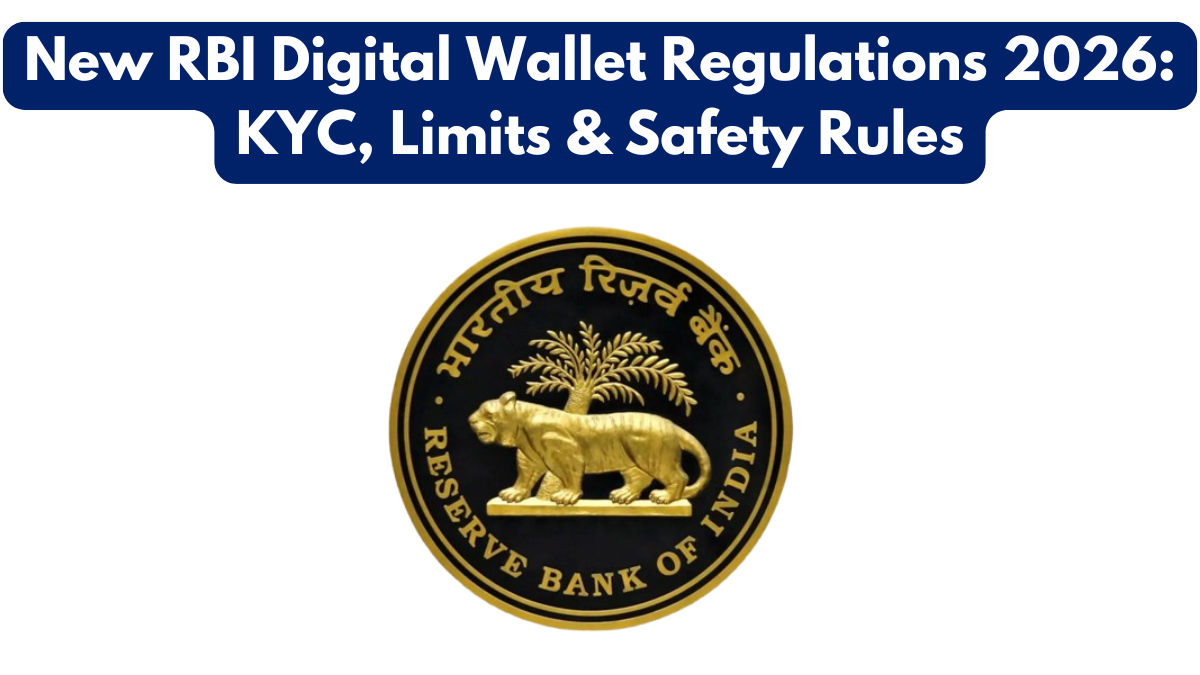The digital payments ecosystem in India has grown rapidly, and the new digital wallet rules india announced for 2026 represent a major shift toward safer and more transparent online transactions. With millions relying on mobile wallets for everyday payments, the Reserve Bank of India has introduced stronger compliance measures and enhanced user protection. These new rules are part of continuous rbi updates designed to ensure secure digital transactions while promoting financial inclusion. As mobile wallet usage expands across urban and rural regions, understanding these changes becomes essential for both consumers and businesses.

Overview of the Updated 2026 Wallet Regulations
The latest digital wallet rules india aim to refine KYC processes, introduce transaction limits, and mandate improved fraud prevention mechanisms. These changes not only strengthen security but also ensure that all wallet providers follow a standardized compliance structure. The 2026 guidelines also include several rbi updates covering data privacy, multi-factor authentication, and dispute resolution timelines. By enforcing these rules, the RBI ensures that mobile wallet companies maintain transparency and accountability.
The new regulations have opened pathways for interoperability, allowing users to transfer funds easily between different wallets and bank accounts. This is an important step that aligns digital payments with global standards, further boosting trust and accessibility across platforms.
Key Changes Under the 2026 Digital Wallet Rules
The updated digital wallet rules india focus heavily on improving identity verification steps. Users are required to complete full KYC within a stipulated timeframe to continue using unrestricted wallet features. These mandatory rbi updates strengthen user identity validation, reducing risks associated with unverified accounts. Additionally, wallet providers are now expected to maintain stronger data encryption protocols to protect user information from potential breaches.
Another major change includes enhanced oversight on wallet-funded transactions. The RBI has emphasized that wallet companies must implement advanced fraud detection tools to monitor suspicious activities in real time. By prioritizing cyber safety and customer protection, these updates help ensure smoother and safer digital wallet operations.
New Transaction Limits and Wallet Categories
Below is an updated table summarizing the 2026 digital wallet rules india related to usage limits:
| Wallet Type | KYC Requirement | Monthly Transaction Limit | Key Notes |
|---|---|---|---|
| Minimum-KYC Wallet | Basic KYC Required | ₹10,000 Limit | For small-value transactions |
| Full-KYC Wallet | Complete KYC Required | ₹2,00,000 Limit | Supports interoperability |
| Business Wallet | Business KYC Required | ₹5,00,000 Limit | For commercial digital payments |
| Cross-Border Wallet | Mandatory KYC + Verification | As Per RBI Rules | For international or NRI users |
These figures align with the newest rbi updates and ensure wallet usage remains secure and regulated. The emphasis is on encouraging full KYC, which offers greater transaction flexibility and safety.
Enhanced Safety Features Introduced in 2026
One of the central goals of the improved digital wallet rules india is to promote safer digital transactions through technology-driven security upgrades. Two-factor authentication, AI-based fraud detection, and instant reporting channels are now mandatory features for all wallet providers. These rbi updates give users stronger protection against unauthorized access, phishing attacks, and payment failures.
The RBI has also mandated that wallet companies provide a simple and responsive customer support system. Users must be able to report issues quickly, and companies are required to resolve disputes within shorter timelines. These measures bring digital wallets closer to the reliability of traditional banking services.
Conclusion
The revised digital wallet rules india serve as a major milestone in strengthening India’s digital payment system. Backed by essential rbi updates, the 2026 guidelines ensure better KYC compliance, enhanced safety features, and more efficient dispute resolution. These changes create a safer environment for users and help boost trust in digital transactions. As digital wallets continue to grow in popularity, these regulations will play a crucial role in shaping a secure and transparent financial ecosystem for the future.
FAQs
What are the major rbi updates under the new digital wallet rules india?
The updates include revised KYC guidelines, increased security measures, stricter transaction monitoring, and improved dispute resolution timelines.
Do I need full KYC to use all wallet features?
Yes, users must complete full KYC to enjoy high transaction limits and full wallet functionality.
What is the maximum limit for a fully verified wallet?
A fully verified wallet allows monthly transactions up to ₹2,00,000 under the new 2026 rules.
How do the new rules improve payment safety?
They mandate enhanced encryption, two-factor authentication, and AI-based fraud detection tools for all wallet providers.
Are business wallets included in these new regulations?
Yes, business wallets must also comply with the updated RBI rules, including specific KYC and transaction guidelines.
Click here to learn more